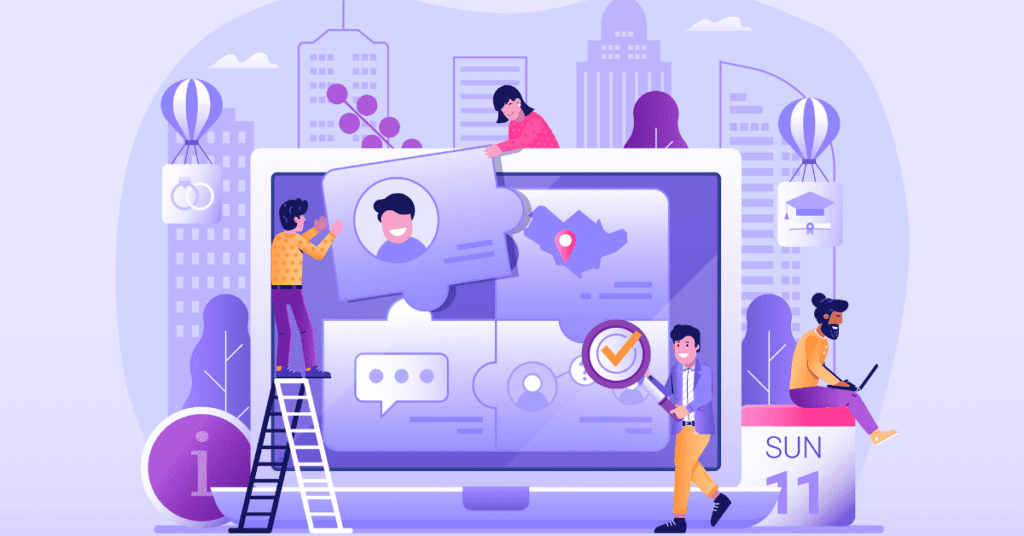Personalized marketing is helping brands connect with consumers on a human level.

It’s noisy out there for consumers. With so many companies trying to get their attention – and their business – what can a brand do to stand out?
The answer: personalized marketing. Modern consumers are in control of the buying journey and they know it. To capture their attention and interest, connect with them in a way that lets them know you understand their needs and can help them.
Today’s consumers want to be a priority for the brands they deal with. They don’t want to receive communication. They want to have a conversation. 71 per cent of consumers express some level of frustration when their shopping experience is impersonal. Therefore, leading marketers are doing all they can to tailor messaging and content to create the custom experiences consumers want.
What is personalized marketing?
Personalized marketing is about talking to your audience one-on-one with customized messages based on what you know about them. The goal is to have a human-level interaction that reflects your understanding of their likes and interests.
While traditional marketing focuses on delivering one-size-fits-all messaging at a mass audience with diverse backgrounds and interests; personalized marketing focuses on making individuals feel the company is speaking directly to them and only them. 66 per cent of customers expect companies to understand their needs and expectations.
That understanding comes from the information you collect about individual customers and potential customers. This can include demographics, likes, dislikes, what they’ve purchased from you in the past and much more.
Use all the data you are collecting about your target audience to create detailed buyer personas. These research-based fictionalized versions of your target shoppers describe who they are, what they want, their challenges, interests and how they make decisions. The buyer personas will allow you to personalize all your marketing and advertising campaigns. This is critical.
The benefits of personalized marketing
Personalized marketing can:
- help build and strengthen relationships with customers;
- boost engagement;
- reduce the costs to acquire new customers;
- improve customer retention;
- improve conversions; and
- increase revenues.
Why personalized marketing important?
Accenture surveyed 8,000 consumers across North America and Europe to find out what they want and expect from their interactions with brands. The results make the business case for a personal touch:
- 91 per cent of consumers are more likely to shop with brands that recognize and provide relevant offers and recommendations.
- 83 per cent of consumers are willing to share their data to enable a personalized experience.
- 73 percent of consumers said that a business has never communicated with them online in a way that felt too personalized or invasive.
What personalized marketing looks like in practice
Customized email marketing campaigns
From welcome emails to birthday and anniversary emails to cart abandonment emails, you can use personalized emails to educate, enhance a customer experience and drive sales. Personalized emails have 29 per cent higher opening rates and 41 per cent higher click-through rates than impersonal ones.
Tip: Segment your customers and email lists by interests, needs, demographics, geography or purchase history – whatever makes the most sense to achieve your campaign objectives. Create tailored emails that are relevant to your customers.
Personalized advertising
Previously known as interest-based advertising, personalized ads target customers interests. The goal is to send relevant ads to customers that will help enhance the customer experience and improve ROI for advertisers.
Google ads are personalized when they are based on historical data; for example, the user’s previous search activity, demographic information or location.
Targeted product recommendations
Use your customer’s purchase behaviour to recommend other relevant, related and useful products. Ask your customers to get more specific about their interests so you can refine and tailor your recommendations accordingly.
Tip: Don’t limit your recommendations to products. Suggesting relevant articles or blogs is a straightforward way to build trust and engage new, current and older customers.
Tailored content
A well-crafted and highly detailed buyer persona can help you develop the content your audience wants.
Personalized web pages
This is all about creating experiences that make visitors feel recognized when they land on your site. For example, first-time customers can be greeted with a welcome message or content that serves as an introduction to your business.
Targeted promotions
Offering tailored discounts based on previous purchases or in recognition of customer loyalty is a good way to engage or re-engage customers.
Fast facts: 52 per cent of customers expect offers to always be personalized. And 66 per cent of customers expect companies to understand their unique needs and expectations.
Personalized video
The rise of personalized marketing is happening at the same time as the rise of video in marketing. Ninety-three per cent of marketers who use video say it’s integral to their overall marketing strategy. Personalized videos leverage consumer data to create videos that are relevant for individual users. These can include everything from explainer videos based on a topic they’ve searched to a product video based on other products they’ve shown interest in.
Personalization in marketing allows brands to interact with their audience in a way that is human and meaningful. It’s what will allow you to connect with prospects and customers with the right message at the right time. Most importantly, it’s what customers want.

